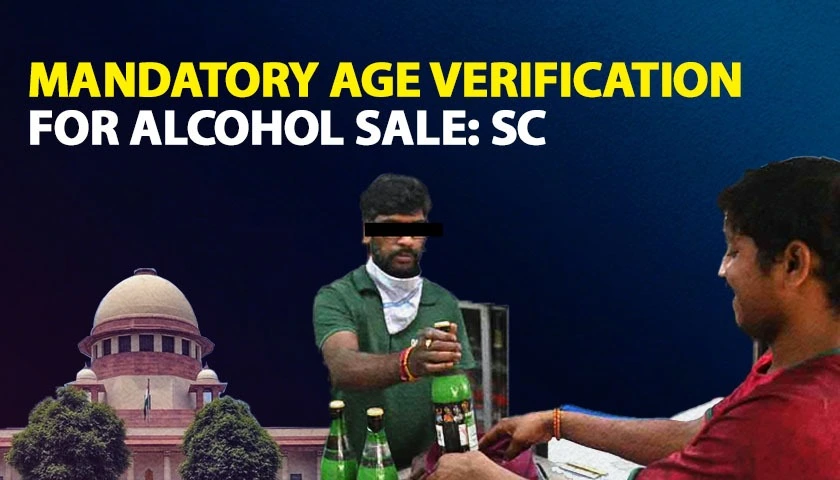NEW DELHI: The Supreme Court on Monday sought a response from the Centre on a PIL seeking directions to implement a robust policy for establishing a mandatory age verification system at all points of alcohol sale in view of divergent age legal drinking age across the States.
A bench of Justices B R Gavai and K V Vishwanathan issued notice to the Union government on the plea by Delhi-based Community Against Drunken Driving (CADD), a non-governmental organisation that has been working for 23 years in preventing alcohol-related tragedies.
The plea also sought a direction for creating a uniform framework for alcohol regulation across states, and reducing and preventing the increasing menace of drunken driving.
Senior advocate P B Suresh, advocate Vipin Nair appeared for the petitioner NGO, which also highlighted the stark disparity in legal drinking age across different states in India.
It pointed out Goa permits alcohol consumption from the age of 18, Delhi maintains a higher threshold at 25 years. This variation extends to other states as well as Maharashtra prescribes 25 years, while Karnataka and Tamil Nadu allow drinking at the age of 18.
The plea also drew the court's attention to the correlation between underage drinking and criminal behaviour.
It also stated under Article 47 of the Constitution, the State owes a duty to make endeavour to bring about prohibition and that consumption of alcohol by a person can never be regarded as his fundamental right nor can it be said that the right to consume alcohol can be merely regulated and not prohibited.
The studies cited in the PIL claimed early exposure to alcohol significantly increased the risk of violent offences including robbery, sexual assault, and homicide.
The petitioner also referred to the recent Pune car accident case where the lives of two young individuals were taken away by a minor driving under the influence of alcohol.
It also claimed that approximately 42.3% of boys in the age group of 18-25 years had their first alcoholic drink before turning 18, and 90% of them could freely procure alcohol from vendors without any age verification.
It also pointed out the conviction rate for drunken driving remains negligible. "The offence of drunken driving being bailable, the offenders are almost immediately released on bail. To compound matters, underage drunken driving is now not an uncommon phenomenon. Incidents of underage drunken driving have also been widely covered by the press," it said.
As per research and statistics collected by the petitioner organisation, drunken driving is the cause for more than 70% road accidents, resulting in more than 1,00,000 road deaths annually across India. "This figure continues to rise every year. The petitioner believes that a lot of young people might take disadvantage of this policy and the same is matter of grave concern," it said.
The petitioner suggested for implementation of mandatory age check, which should be applied to all liquor selling outlets (liquor vends, hotels, clubs, bars, pubs, food, and beverage outlets) wherein the age of any person who appears to be below the age of 30 should be checked with the help of a biometrics age match using a government issued I card i.e., Aadhaar card/ election I-card or any other. This should be implemented through linking with the UID server.
It also said the Excise Act /Policy should empower all alcohol selling outlets (liquor vends, hotels, clubs, bars, pubs, Food, and beverage outlets) to mandatorily check age proof (Aadhaar card/ election I card or any other) of any customer appearing below the age of 30 years in case of doubt to successfully implement drinking age legislation of the Sate.
Besides, it said the host of a party (an individual or an establishment) should also be held liable if any underage person consumes alcohol in the said establishment or gathering; any untoward incident like brawl, drunken driving accident /death is caused by any person below or above the age of 25 years in the said establishment or gathering; adult / proxy buyer buying alcohol for a minor. It called for penalties and jail term for non compliance with the mandates.















